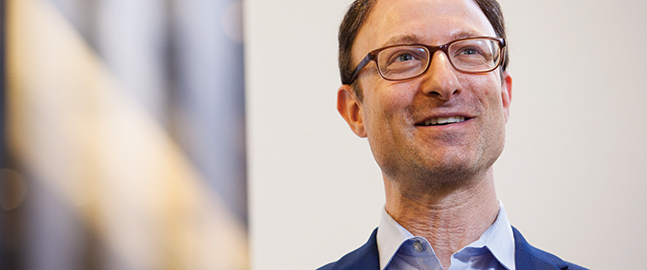The Brandeis Questionnaire
Gregory Zuckerman ’88

Eytan Kobre
Gregory Zuckerman ’88
During his 26 years at The Wall Street Journal, investigative reporter Gregory Zuckerman ’88 has covered behind-the-scenes moves at financial firms, the ins and outs of stock and bond trading, and other business topics. He’s served as lead writer for the paper’s widely read “Heard on the Street” column; broken high-profile stories, including JPMorgan’s “London Whale” scandal; and won business journalism’s highest honor, the Gerald Loeb Award, three times.
He also brings ripped-from-the-headlines stories to life as the author of nonfiction bestsellers that read like fast-paced novels. Through dogged reporting — and a flair for describing dramatic twists and turns — he untangles abstruse concepts to reveal the maverick personalities who transform markets, science, and society, often while making themselves billionaires.
Zuckerman wrote his latest book, the critically acclaimed “A Shot To Save the World: The Inside Story of the Life-or-Death Race for a COVID-19 Vaccine,” while holed up at home during the pandemic. It recounts the improbable story of the unlikely group of scientists (including Drew Weissman ’81, MA’81, P’15, and Katalin Karikó, whose mRNA research underpins the Pfizer and Moderna vaccines) and the biotech executives who created a stunning medical breakthrough in record time. The book has been optioned as an HBO miniseries.
Three earlier books explored the subprime mortgage crisis, fracking, and Wall Street’s quant-trading revolution. “The Greatest Trade Ever” describes hedge fund manager John Paulson’s providential 2007 bet against an inflated housing market. “The Frackers” explains how the U.S. became an energy power. And “The Man Who Solved the Market” profiles Jim Simons, who used mountains of data and algorithms to become modern finance’s greatest moneymaker.
Yet the books Zuckerman enjoyed writing most were co-authored with his sons, Elijah and Gabriel. “Rising Above: How 11 Athletes Overcame Challenges in Their Youth To Become Stars” and “Rising Above: Inspiring Women in Sports,” aimed at young readers, describe how sports stars surmounted challenges to meet success.
“I do have an affinity for people who believe in themselves, or have an approach that the conventional wisdom dismisses, and overcome all kinds of odds,” Zuckerman said during a recent appearance on the New York Stock Exchange’s “Inside the ICE House” podcast. “I think there are a lot of life lessons we can learn from them.”
Brandeis, where Zuckerman majored in politics while taking economics courses, was a great fit for a young man with an interest in the media world. Early in his college career, he hosted a WBRS reggae show and did sports reporting on the “Adam Brauer Bar Mitzvah Hour.”
“Only at a small school can you get on-air as a first-year,” he says.
What was your idea of perfect happiness when you were at Brandeis?
Sherman cafeteria, most every evening. My friends and I rolled in around 5:30 p.m.; greeted Thelma, the kosher server; and spent close to two hours trading jokes, insights, and insults. Delicious food and the closest friendships of my life — who could ask for more?
Who was your favorite Brandeis professor?
There were many. Gerald Bernstein opened my eyes to art and architecture. Ruth Gollan was a brilliant Hebrew teacher. And Andreas Teuber’s philosophy lessons still influence me.
Where did you usually spend Saturday night?
At a party, holding up a wall, mustering the courage to ask someone to dance. Instead, I usually ended up debating the Red Sox or the Patriots with Dave McKee ’88.
What is the most important value you learned at Brandeis?
The need to be a critical thinker.
What was the most important shortcut you learned in college?
Focus on the intonations and body language of lecturers. You can learn a lot from how information is conveyed.
Which talent did Brandeis help you develop most?
The ability to poke holes in an argument.
What do you wish you had studied harder?
Computer science. Dropped a class after just one day.
What three words of advice would you give to current Brandeis students?
Can I have four? Find your competitive advantage. I’m convinced you can prosper in life with just one skill or ability that’s a bit better than those of your peers.
If you could go back to college, what would you do differently?
Take a music theory class.
What would your friends say is your greatest strength?
My perseverance and work ethic.
What would your friends say is your greatest weakness?
I’m way too competitive. I’ll throw a tennis racket when I blow a shot in a family match. My kids find it amusing. My wife? Not so much.
What is your blind spot?
I can ask too many questions. I’m genuinely interested in others, their challenges and accomplishments. Everyone has an interesting story. But the stream of questions can be annoying, I’m sure.
What book do you read again and again?
“Indecent Exposure: A True Story of Hollywood and Wall Street,” an overlooked business narrative.
Which possession do you most like to look at?
My baseball card collection. It transports me to a time of innocence and optimism.
Whom would you like to sing a duet with?
I wouldn’t subject anyone to that. But I’d love to write a song for Paul Kelly, an underappreciated Australian singer/songwriter.
Which bad break was your biggest blessing?
I was fired from my first two jobs. After the second, I collected my belongings and headed for the exit, embarrassed and unsure of my future. An older colleague walked me down. “Someday you’ll see this as the best day of your life,” she told me. She was right.
On your deathbed, what will you be most grateful for?
My sons and my wife. And my parents — for making me a New York Yankees fan.
